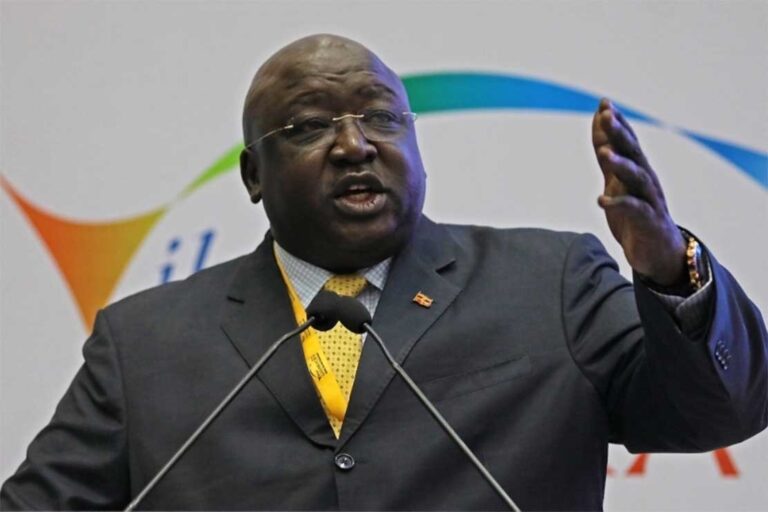
A cross section of CAADP delegates including development partners, heads of state and agriculture experts from 43 AU member states
HABARI DAILY I Kampala, Uganda I Despite having over 65% of the world’s uncultivated arable land, Africa spends up to $100b (sh360 trillion) on food imports annually, a donation to the developed countries.
While officially opening the African Union (AU) Comprehensive Africa Agriculture Development Programme (CAADP) summit at the Munyonyo Commonwealth Resort in Kampala on Thursday, Robinah Nabbanja, Uganda’s Prime Minister urged African countries to feed themselves.
“The continent is relying on food imports despite being endowed with arable land and water bodies. Let us work deliberately to get what we want as a continent,” he said urging the sector ministers to guide their respective countries on how to readjust to meet the targets.
Nabbanja said food security policy reviews and investment in research, irrigation and mechanisation are a must if Africa is to mitigate climate change and enhance production.
He called upon the leaders to take advantage of the African Continental Free Trade Area and stop exporting raw materials. “We should export finished and branded products from Africa. That’s the only way we will break free,” she noted.
The three-day meeting, which kicked off on January 9th with a ministerial session, aims to review the CAADP, the continent’s blueprint plan for fast-tracking agriculture development.

Robinah Nabbanja, Uganda’s Prime Minister (L), Frank Tumwebaze, Uganda’s Minister of Agriculture, among other delegates attending the Munyonyo-held CAADP summit
Set to end on January 11th, it is being attended by over 2,000 delegates including development partners, heads of state and agriculture experts from 43 AU member states.
The gathering also aims to finalise the CAADP strategy and Action Plan 2026-35, which is expected to transform Africa’s agriculture.
Dr Girma Amente Minister of Agriculture of the Federal Democratic Republic of Ethiopia, whose Prime Minister Dr. Abiy Ahmed, is the CAADP Champion, highlighted how Ethiopia has cascaded CAADP into the national agricultural investment plan (NAIP).
“The plan emphasises the importance of increasing public investment in agriculture, which is crucial for achieving the CAADP target. Ethiopia has significantly increased its agricultural budget allocation and has demonstrated its commitment by meeting the 6% annual growth target of CAADP.”
Agriculture research is key
Frank Tumwebaze, Uganda’s Minister of Agriculture, Animal Industry and Fisheries, said to meet Africa’s Agenda 2063, countries should switch to full implementation mode.
He said it’s unacceptable that Africa, with its fertile soils and abundant water, still struggles with food insecurity, and imports basic agricultural commodities, calling upon countries to focus on agriculture research, technology adoption, and removing trade barriers to foster intra-Africa trade and regional development.
Josefa Sacko, the AU commissioner for Agriculture, Rural Development, Blue Economy and Sustainable Environment, said no country is on track to meet the Malabo CAADP goals and targets by 2025.
At the AU Summit in Malabo, Equatorial Guinea in June 2014, AU countries adopted concrete agriculture goals to be attained by 2025.

Delegates attending the CAADP summit in Munyonyo, Kampala
According to the African Union Commission, the new strategy is a response to the continent’s failure to achieve the Malabo CAADP goals. The goals, which were set in 2014, aimed to boost agricultural productivity, improve food security, and reduce poverty.
Africa’s food security remains a pressing challenge, exacerbated by climate change, conflicts, rapid population growth, and economic disruptions. Currently, over 280 million Africans suffer from chronic hunger while food systems struggle to meet rising demands.
The outcome of the summit is expected to have a significant impact on Africa’s agricultural sector, which employs over 70% of the continent’s population. The sector is also critical to Africa’s economic growth and development, accounting for over 20% of the continent’s GDP.
About the CAADP
The CAADP is an African Union Agenda 2063 continental initiative that aims to raise agricultural productivity, increase public investment in agriculture, and stimulate economic growth through agriculture-led development, thus helping African countries eliminate hunger and reduce poverty.
Launched in 2003 following the Maputo Declaration and reaffirmed in 2014 in Equatorial Guinea with the Malabo Declaration, it focuses on improving food security and nutrition and increasing incomes in Africa’s farming-based economies.




